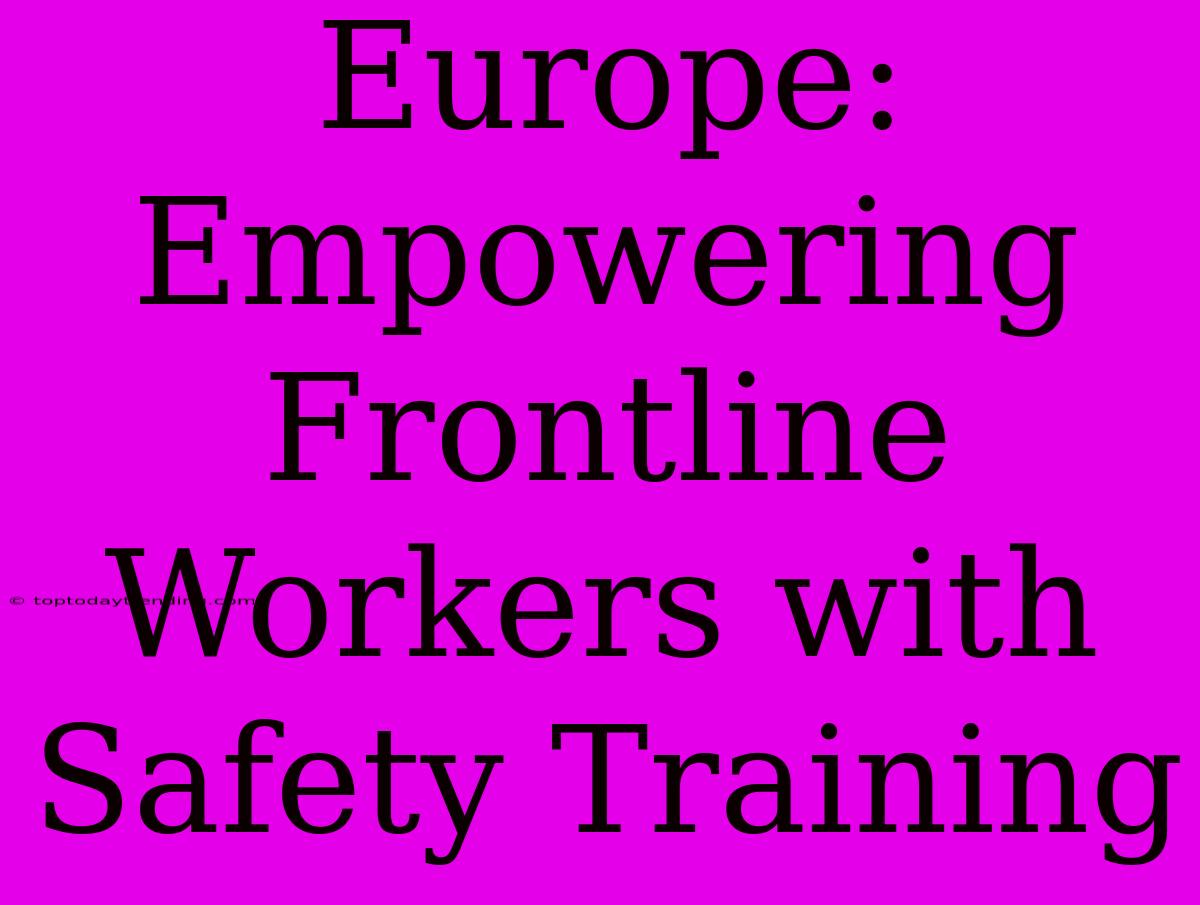Europe: Empowering Frontline Workers with Safety Training
The safety of frontline workers is paramount, especially in Europe, where a diverse range of industries and workplaces demand robust safety protocols. From construction sites to factories and healthcare facilities, these individuals are at the heart of economic activity and deserve comprehensive training to mitigate risks and foster a culture of safety.
The Importance of Safety Training for Frontline Workers
Why is safety training so crucial?
- Reduced accidents and injuries: Proper training equips workers with the knowledge and skills to identify hazards, implement safety measures, and respond effectively to emergencies. This significantly reduces the risk of accidents and injuries, protecting both individuals and the organization.
- Enhanced productivity and efficiency: A safe working environment fosters a sense of security and confidence among employees, leading to improved focus, higher productivity, and fewer work disruptions caused by accidents or injuries.
- Improved morale and employee retention: Investing in safety training demonstrates a commitment to employee well-being, boosting morale and employee satisfaction. This, in turn, can lead to improved retention rates and a more engaged workforce.
- Compliance with regulations: Across Europe, various regulations and standards mandate safety training for specific industries and roles. Compliance ensures legal protection and prevents penalties for organizations.
- Cost savings: While initial investment in training is essential, it's far more cost-effective than the financial burden of accidents, insurance claims, and legal repercussions.
European Initiatives for Frontline Worker Safety
Recognizing the critical need for safety training, European institutions and organizations are actively promoting initiatives to empower frontline workers:
- European Agency for Safety and Health at Work (EU-OSHA): EU-OSHA plays a vital role in raising awareness about workplace safety and promoting best practices through campaigns, research, and resources.
- OSH-NET: This network of national focal points for occupational safety and health (OSH) facilitates information exchange and collaborative projects across member states.
- European Framework for Occupational Safety and Health: This framework provides a comprehensive strategy for improving occupational safety and health, focusing on areas like training and risk management.
- National initiatives: Individual European countries are implementing their own safety training programs tailored to specific industries and national regulations.
Key Areas of Safety Training
Training programs must be comprehensive and tailored to the specific risks and challenges faced by frontline workers:
- Hazard identification and risk assessment: Workers must be able to identify potential hazards in their work environment, assess their severity, and develop mitigation strategies.
- Personal Protective Equipment (PPE): Proper use and maintenance of PPE, including safety glasses, gloves, footwear, and respirators, is crucial for protecting workers from injuries.
- Emergency preparedness: Workers should be trained on procedures for handling emergencies, including fire safety, first aid, and evacuation plans.
- Safe handling of equipment and machinery: Training on the proper use and operation of tools, machinery, and equipment is essential to prevent accidents and injuries.
- Workplace violence prevention: Frontline workers in certain industries may face risks of workplace violence. Training on recognizing and responding to aggressive behavior can help mitigate these risks.
- Specific industry training: Training programs should be customized for specific industries, such as construction, manufacturing, healthcare, and transportation, to address their unique safety concerns.
The Future of Frontline Worker Safety
As technology and workplaces continue to evolve, safety training needs to adapt accordingly:
- Digital learning platforms: Online training platforms can provide flexible, accessible, and engaging learning experiences for workers.
- Virtual reality (VR) simulations: VR technology can offer immersive training scenarios for practicing safety procedures in a safe, controlled environment.
- Data-driven safety analysis: By analyzing safety data and identifying trends, organizations can tailor training programs to address specific workplace hazards and improve safety outcomes.
By investing in comprehensive and effective safety training, European organizations can empower their frontline workers, create a safer working environment, and foster a culture of safety that benefits everyone.

